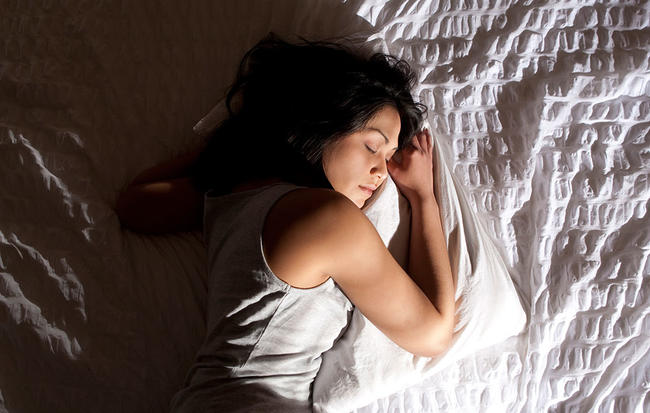Too little sleep, no matter if it’s from an inability to fall asleep, stay asleep, or get into deep sleep, puts a damper on productivity and energy.
And, if you feel like sleep affects you more than it did a few years ago, you’re not imagining things. The lingering effects of inadequate sleep seem to get worse as we age, not to mention that it can be harder to pinpoint the exact cause. If cutting back on caffeinated beverages hasn’t solved your sleep issues, then consider these factors that might be sabotaging your shut-eye.

Dark Chocolate
Dark chocolate offers cardiovascular health benefits, but it may also keep you up at night. While milk and dark chocolates both contain caffeine, dark chocolate has a little over three times as much the caffeine equivalent of a cup of tea. Additionally, chocolate is derived from the cacao plant which contains the chemical theobromine that’s associated with increasing heart rate and alertness, meaning high-quality dark chocolate is loaded with two potential sleep disruptors.
Solution: Enjoy your dark chocolate for a mid-afternoon snack rather than dessert. And if you do consume at night, avoid pairing it with a caffeinated beverage.

Naps
Sunday afternoon naps are an indulgent treat for me, so it pains me to write this, but afternoon naps can hurt your overall sleep. Napping can disrupt your body’s natural clock and prevent you from going to sleep later that night. And even though you’ve gotten some quick daytime sleep, it often doesn’t compare to higher quality, deep sleep at night.
Solution: Sleep experts recommend you nap only if you have fatigue or sleepiness that’s more than normal or if you have a daily nap habit. When you do nap, make it quick (around 30 minutes) and take it early to mid-afternoon.
Bathroom Breaks
It’s second nature to take a water bottle most places, which is a great health habit, unless your water intake during the day is waking you up during the night. Waking up to head to the bathroom more than once per night may be disrupting your overall sleep quality.
Solution: If this is a problem, try consuming more of your water and fluid intake during the first half of the day. Some fluids late afternoon and evening are fine, but not so much that a full bladder wakes you up.

Glass of Wine
First inclinations might be that a glass of wine helps since it often induces sleepiness. And while it may help you go to sleep, the real problem comes a few hours later when alcohol acts more as a stimulant causing you to have more restless, poor quality sleep.
Solution: Best sleep appears to come with no consumption of alcohol, but if you do partake of alcohol limit it to moderate amounts (1-2 drinks) and 2 to 3 hours before bedtime.

Watching the Clock
Nothing can be more frustrating than lying in bed watching the minutes tick by that you’re awake. But did you know watching the clock can actually make the situation worse by increasing your stress, frustration, and anxiety, only perpetuating the lack-of-sleep cycle?
Solution: If you can’t go to sleep after 20 minutes, expert recommend that you get up and do a light activity like read a book in a dimly lit room. You’ll likely feel sleepy and ready for bed sooner rather than later.
Hormones
As if they didn’t affect enough already, fluctuating levels of estrogen and progesterone can disrupt sleep for young women certain days of the month, but particularly for older women in early menopause.
Solution: If hormones are affecting sleep, establishing a consistent schedule that also incorporates physical activity can help. Other tips include keeping the bedroom cool and establishing a regular bedtime routine.

Ordering a Steak
Foods high in protein and saturated fat such as red meat take a longer time to digest, and research has associated these high fat foods with a decrease in quality of sleep and an increase in the amount of time you spend awake in bed.
Solution: Choose leaner cuts and smaller portions or swap the steak for salmon. Its inconclusive whether cold-water fish like salmon can aid in sleep, but research does suggest that vitamin D and omega-3 fatty acids, two nutrients high in salmon, are required for proper sleep regulation.

Bowl of Ice Cream (or Dessert?)
Enjoying a sweet treat often seems like the perfect way to wrap the day up, but high sugar foods before bed can cause your blood sugar to spike and the pancreas to over-secrete insulin. The effect can be low blood glucose levels and hunger pangs that can wake you up later in the night.
Solution: Have dessert 3 to 4 hours before heading to bed, choose a snack that’s low in sugar with a little fiber instead, or skip the sweets altogether.

Enchiladas
Eating a big meal of spicy or rich foods can set you up for a restless night, particularly if you’re prone to heartburn. Fat slows the entire digestion process, so those spicy flavors sit in the stomach longer (not a good combination when you’re laying horizontal).
Solution: Avoid eating spicy and higher-fat foods like pizza within 3 hours of bedtime. If it’s unavoidable, try to consume smaller portions and elevate your head slightly when going to sleep.

Bailing on Your Running Partner
Skipping your workout, or even cutting intensity or duration significantly, affects sleep. In fact, the National Sleep Foundation found that those who don’t get regular physical activity have significantly lower quantity and quality of sleep compared to those who do exercise regularly.
Solution: Establish a regular activity pattern and stick with it. Try exercising earlier in the day or at least three hours before bedtime.












